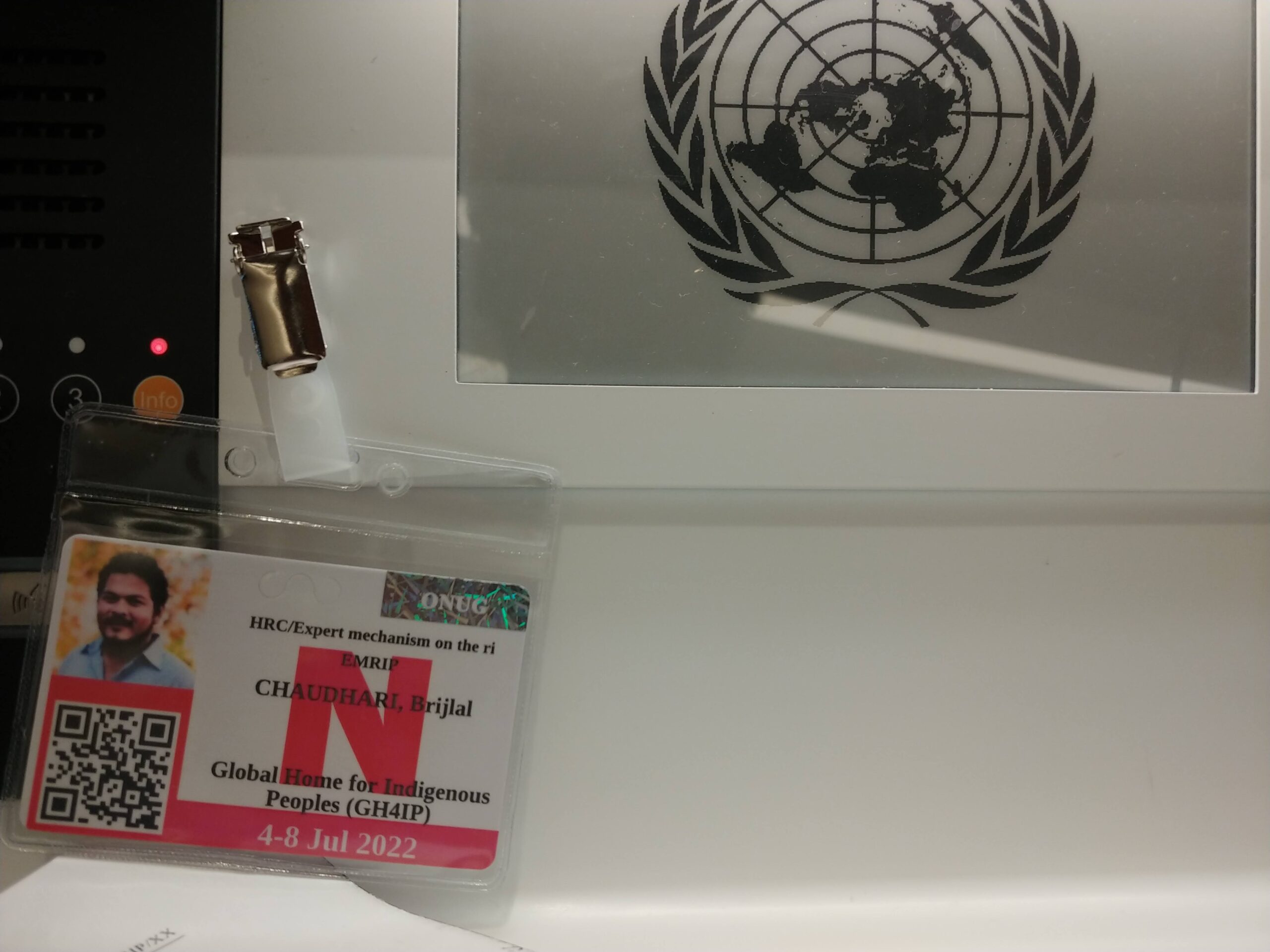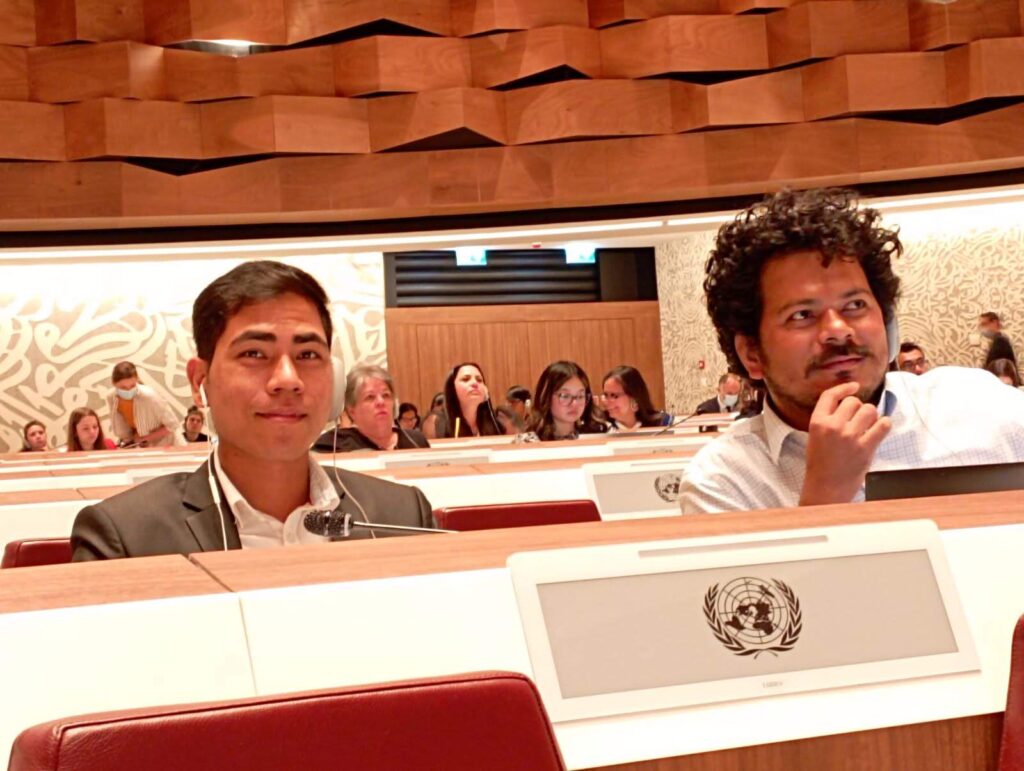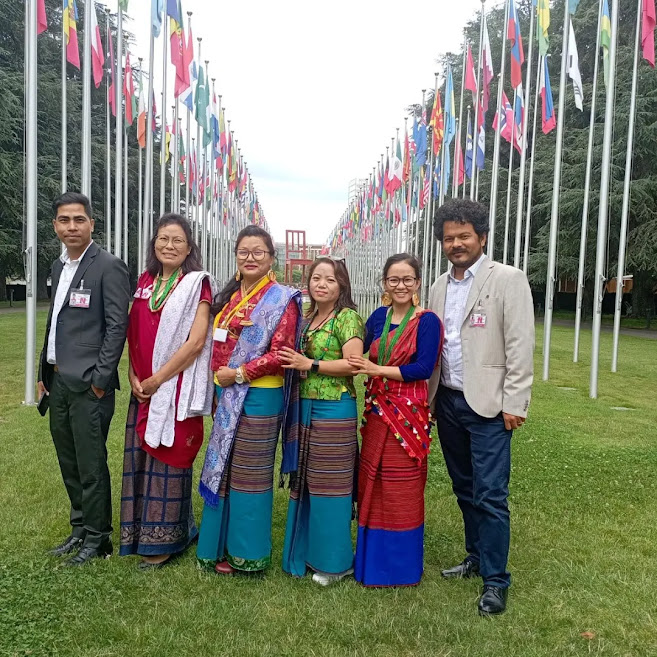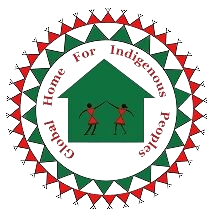

I represented Global Home for Indigenous Peoples in Geneva from July 4-8, 2022, for the 15th session of the Expert Mechanism on the Rights of Indigenous Peoples. It was powerful moment for me to be in a room full of Indigenous Peoples from all seven socio-cultural regions of the world. Below are the statements that I delivered.
Statement on agenda item #3: Study on Treaties, agreements, and other constructive arrangements, between indigenous peoples and States, including peace accords and reconciliation initiatives, and their constitutional recognition.
Distinguished chair of the EMRIP, representatives of the member states, Indigenous brothers and sisters, and everyone present here physically and virtually, Namaste!
Thank you for giving me the time to speak and share the story about my community.
My name is Brijlal Chaudhari, and I am Tharu nation from Nepal. I would like to bring your attention to Nepal who has ratified ILO Convention no. 169 and adopted the UN Declaration on the Rights of Indigenous Peoples (UNDRIP). However, the government of Nepal has little or no political will to internalize these international laws and mechanisms. As a result, Indigenous Peoples are still waiting to be consulted in creating a national action plan to implement the ILO Convention 169 and the UNDRIP. The Indigenous Peoples of Nepal have not felt any significant changes in their lives and often feel ignored. Indigenous Peoples continue to face systemic discrimination, suppression, assimilation, and criminalization. The policies towards Indigenous Peoples are paternalistic and the government has little interest to reconcile with its Indigenous Peoples.
Now I would like to focus on the Tharu Peoples. Nepal government promulgated its constitution in 2015 without the full and meaningful participation of Indigenous Peoples. The constitution was rushed and had little regards for the rights of Indigenous Peoples. Thus, an autonomous Indigenous Tharu State within the new federal system was not allocated. This killed the dream of Tharu People to self-govern themselves and their right to their land and their territories. As a result, Tharu Peoples were forced to organize a peaceful demonstration to show their frustration with the decision. The peaceful protest turned violent that killed 9 Police officers and a child in Tikapur, Kailali District.
The Tikapur incident is a consequence of years of unfair treatment and structural violence toward the Tharu community. The security forces, including the Home Ministry believed that the violence was premeditated and saw it as a criminal offense. Thus, the security forces responded with violence against the Tharu Peoples. Many Tharu homes and businesses were burned down in Tikapur. The Tharu Peoples who had no relation to the protest were also attacked, tortured, intimidated, arrested, and incarcerated for years.
Subsequently, 11 people were sent to prison for life for their alleged roles in the violence. Upon appeal, the three people were released from the prison. Currently, eight people, including a Member of Parliament from Tikapur, Resham Chaudhary, are serving prison sentences for life.
Following the incident, an independent commission called Laal Commission was formed to document the truth and inform the government. The commission submitted a report to the government, but to this date it has not been made public. By hiding the truth, the government wants to sweep away the Indigenous issues like dirt and continues to suppress the Tharu Peoples’ right to self-determination and self-government by criminalizing our movement. The reaction of the government of Nepal violates the spirit of the ILO Convention No. 169 and the articles of the UNDRIP. The Tikapur incident is a political issue, and the Nepal government should seek a political solution to this issue. The reaction of the Nepal government to this incident shows how Indigenous Peoples’ rights and aspirations are ignored by the Nepal government and there is little room for Indigenous peoples to fully realize their potential.
As an Indigenous Tharu nation I want to feel safe in Nepal and exercise my rights as Indigenous people because I was born in this country. I want my children to grow up in Nepal and feel safe and express their indigeneity. I do not want my children to face discrimination by the State just because they identify as Tharu. Hence, I kindly request this session to urge the Nepal government to:
1. share the Laal Commission Report with the public and use the findings of the report to serve justice to the victims of the incident.
2. immediately release the 8 Tharu political prisoners with respect and compensation.
3. make a formal apology to the families who were arrested, tortured, and jailed for years without any connection to the incident.
4. invite the Special Rapporteur on the Rights of Indigenous Peoples to make an official visit to Nepal and independently investigate the case.
5. undertake a comprehensive legal and policy reform program to advance the implementation of Nepal’s commitments under UNDRIP and ILO Convention 169:
a. by immediately drafting a national action plan to implement the Convention to strengthen the relationships between Indigenous Peoples and the state.
b. by implementing the world conference of Indigenous Peoples’ outcome document by drafting a national action plan to achieve the ends of UNDRIP without any delays.
Once again, thank you EMRIP for this opportunity to share my story.
Thank you!


Statement on agenda item #7: International Decade of Indigenous Languages.
Thank you EMRIP and the International Decade of Indigenous Languages (IDIL) Task Force for the work plan. The work plan is instrumental for Indigenous Peoples’ way of life and their cultural sustainability. Such initiative makes me hopeful about our future.
For a moment, I want to take you to all to my family. My grandfather was a Tharu leader. He was denied attending the council of the King of Nepal in 1950 because he did not speak the official language (Nepali). My mother speaks Tharu (an oral language). She does not speak Nepali that creates a disability for her to seek government services. Basically, she does not exist for the state, and the state does not exist for her. The Nepali structure is culturally violent towards Indigenous Peoples and excludes us. Hence, the Nepali structure gave us no choice but to integrate and assimilate with the dominant culture that has continued to rule the country.
Such a situation created a lot of pressure and shame in the family. I was sent to school where I learned in Nepali. My family wanted me to integrate into the Nepali system and not be discriminated and marginalized. And I did. It took me away from my family when I was ten. I received an education, but I lost the time I could have had with my family, especially my grandfather, who held much Tharu oral knowledge that was transmitted to him by his ancestors.
Nepal is a multicultural state and over 35 percent of the population is Indigenous. Nepal is proud of its multicultural society and benefits tremendously when it comes to advertising for its Tourism goals and targets. The government of Nepal exhibits Indigenous Peoples in the ethnographic museum in Kathmandu to showcase the diversity offers. However, Nepal lacks a clear vision for a multilinguistic society and to create a culturally vibrant society that is rooted in the celebration of diversity. Similarly, the education system does not support multicultural education or provide education in Indigenous languages. Nepal is still suppressing the growth and development of Indigenous Languages. With the loss of Indigenous languages, we are losing traditional knowledge that are coded in our oral language.
Indigenous Peoples’ culture and traditions and languages are struggling to thrive as the dominant culture and language squeeze Indigenous languages. In Nepal, we have the right to open a radio station in our own languages, but the state is too slow to teach the Indigenous languages in the schools and provide services in the Indigenous languages including while seeking justice.
Through this session, I kindly recommend member states to pay serious attention to the International Decade on the Indigenous Languages: Global Action Plan and create a national policy in full collaboration with the Indigenous Peoples to protect and promote the Indigenous Languages of Nepal for future generations.
I would also recommend that we create an Indigenous Languages Map as well as invest in their revitalization, promotion, and protection.
Thank you!
